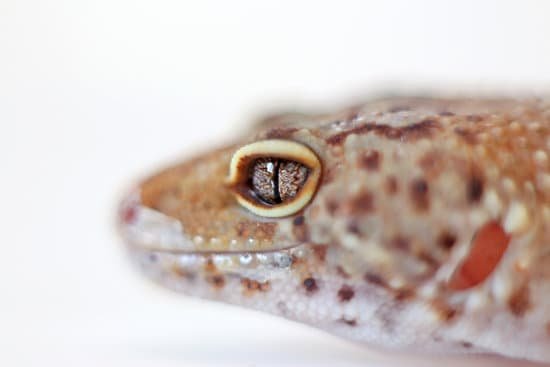Leopard geckos are among the toughest reptiles that you can keep as they rarely get sick. However, if you notice that your pet is acting differently, has lost a lot of weight in a short time, or is lethargic, then you may think of leopard gecko dying signs.
Leopard geckos have a slow metabolism, and when they get sick, they do not often show signs of illness until the disease has progressed significantly.
As a responsible pet owner, you need to understand the health and typical habits of your leos to keep them happy and healthy.
It would be a good idea to keep an eye on your gecko to detect signs of sickness before it is too late.
In this article, you will learn about the various leopard gecko dying signs, how to treat your gecko, and when you need to visit the vet.
This article has been reviewed by Dr. Gospel. Read more about our knowledge control process here.
Contents
6 Symptoms To Tell a Leopard Gecko is Dying

Dying leopard geckos will show some serious illness symptoms such as weight loss, sunken eyes, lack of appetite and lethargy. Some other health problems such as bleeding from mouth, runny or smelly poop also signify that your leopard gecko may be dying.
Notes: Leopard geckos can give obvious and not obvious signs when they are sick. This is why you need to keep an eye on them so you can easily detect an unhealthy gecko and give it the appropriate treatment in time.
If you are worried about your leopard gecko’s health, you can take it to a vet where they can help examine your animal and carry out any tests necessary to show what is wrong with your gecko.
How To Tell If Your Leopard Gecko Is Sick?
One of the main reasons why leopard geckos are kept as a pet by hobbyists is because they are very hardy. They do not die at the slightest problem but can get sick if you do not give them proper care.
Some of the following signs can help to tell if your leopard gecko is sick.
Weight Loss

Your leopard gecko may be suffering from underlying health conditions if they lose a good amount of weight in a short time. Some of the things that can cause weight loss are, poor diet, viral, parasites, or bacterial infections.
Your adult male leos needs to weigh about 60-90g while females are usually lighter and weigh about 45g. Once you notice that your gecko is losing weight, don’t hesitate to take your gecko to an exotic vet for a test.
You need to identify the problem as fast as possible because it can lead to death. This is because your gecko will not be able to fight off illness when experiencing weight loss.
Lack Of Appetite
Weight loss and lack of appetite are two major signs you can use to identify if your leopard gecko is sick. However, a lack of appetite in leopard gecko can be an environmental issue or something more serious.
The best way to tackle a lack of appetite is by ensuring that your gecko’s tank is at optimum condition. Before you assume your pet is dying, you can check the temperature of their cage, try to eliminate things that can cause stress, and make sure they are hydrated.
However, if you notice that your leo is not eating after checking their tank, you should contact a vet.
Abnormal Or No Droppings
One of the best signs to detect if your leo is dying or sick is to check their droppings. If they have abnormal or fewer droppings, they could be suffering from impaction.
Impaction is one of the common reasons for sudden deaths in leopard geckos. Your leopard gecko can get impacted if your pet swallows something that causes digestive issues and other internal problems.
You can easily treat this if you detect that your gecko is impacted at an early stage.
However, if you do not notice early enough it can lead to death. If your gecko has fewer droppings, it means they are eating less food, and they may be suffering from impaction.
Sunken Eyes

On the flip side, if you notice something strange with your pets eyes, go see your vet as soon as possible.
If you find that your leopard gecko’s eyes are sunken into their face, this shows that they are dehydrated. Dehydration is usually the cause of underlying health problems in leopard geckos and can lead to decreased appetite and more sickness to your gecko.
Some of the other dehydration signs in leopard geckos are sticky mucus in their mouth and retained non-shedding skin. However, sunken eyes are the easiest indicator. The good news is that you can easily correct this.
You need to ensure that there is plenty of clean water in their tank to keep them hydrated. You also need to make sure the humidity levels in the enclosure are at an optimum level.
Lethargy
You can easily detect if a lizard is healthy if it has an active and bright eye. If your leopard gecko is active and curious, it shows that they are healthy and happy. You will find your gecko exploring their tank, enjoying the warmth, and hunting for prey when healthy.
However, when your leopard gecko is acting sluggish and stays in one place for hours, they may be sick. Your gecko may also remain hidden under the objects in their tank when they are sick.
When they are sick, your gecko can be too weak to lift themselves or stay in one spot. Once you notice that your leopard gecko is acting sluggish, you may need to immediately take them to the vet.
Can You Treat A Sick Leopard Gecko?
There are some leopard gecko illnesses that you can easily treat yourself if you can detect that they are sick on time. However, for all other situations, you will need to take your gecko to the vet.
The Sickness Symptoms That You Can Treat At Home
Dehydration
Water consumption is as important as food for your pet. When your gecko gets dehydrated, it can lead to its death. The best way to fix dehydration in leopard gecko is always to ensure that there is water in their bowl.
You can also place a moist hide on the warm part of their tank. This can cause condensation, and your gecko can then lick the mist as an alternative source of water for them.
Impaction
If you detect that your gecko is impacted at an early stage, providing a warm bath and gentle belly rub can soften the stool and help with constipation. You can also raise the temperature in their tank to raise your gecko’s metabolism.
However, if the impaction remains, then you may need to take a trip to the vet, and surgery can be used to remove the blockage.
Metabolic Bone Disease (MBD)
Although there is not a cure for this disease and the effects are not reversible. But you can stop the disease from getting more advanced if you provide proper nutrition and dietary supplements.
When You Need A VET?
Some of the signs of sickness in leopard geckos that will need immediate veterinary care are stated below.
- Respiratory problems
- Prolapses from the cloaca
- Drooping head or limbs
- Thinning tail
- Gaping mouth
- Lethargy and weakness
- Loss of weight
- Vomiting/regurgitation
- Detectable lumps or swelling
- Discharge from the eyes or nostrils
How To Help Prevent Sickness In Leopard Geckos?
Some of the ways that you can use to keep your leopard geckos healthy are stated below.
Always Clean Their Tank
Last update on 2022-12-29 / Affiliate links / Images from Amazon Product Advertising API
You need to clean their tank regularly and remove your gecko’s poop. This is because stray crickets can feed on your gecko’s feces, and your gecko can feed on the insect. This can lead to a health problem for your leopard gecko.
Proper Nutrition
You need to ensure that you give your gecko a proper diet and provide them with a variety of feeder insects that provide them with the appropriate supplements.
Buy Their Feeder Insects from Trusted Sources
Avoid feeding your leos with feeder insect sources from the wild because they may be carrying diseases or exposed to pesticides. You need to ensure you get your feeder insects from trusted sources or even breed them yourself.
Proper Hygiene When Handling Them
You need to ensure proper hygiene when handling your gecko. This is because you can leave them exposed to parasites or diseases if you are exposed to parasites or diseases.
When handling, you need to avoid handling several pets without washing your hands in between handling.
Quarantine Your Gecko
Whenever you are housing multiple geckos in the same enclosure, it is best to isolate any gecko that you suspect is sick. This will help to reduce the spreading of the illness among other geckos.
You also need to quarantine new geckos or breeding partners before introducing them to an enclosure with other geckos.
Check The Importance of Quarantining New Reptiles
Proper Humidity and Shedding Care
You need to ensure there is a moist hide that can help your gecko whenever it is ready to shed. After shedding, you can help your gecko take care of the shed skin behind their feet and toes.
Leopard gecko dying of old age
Do leopard geckos die of old age, the answer is yes. Like any other animal, leopard geckos do die of old age. They have an average lifespan of 10 to 15 years in captivity. In some cases, leopard geckos can live up to 20 years. But they still die because of age.
How do you know if your leopard gecko is dying of old age?
One significant sign that your leopard geckos is dying because of old age is that he will stop eating.
When lizards get older, they will not be as proactive as when they were younger. Also many owners noticed that they will get lazier when it comes to eating.
When they stop eating it will lead to weight loss. After a few months, you will have to say bye to your lizard buddies.
Reasons Why Your Leopard Gecko Might Have Died Suddenly
It can be a hard pill to swallow if you lose your beloved pet. It is not only painful that your pet dies, especially if you don’t have a clue regarding what might have caused their death. There are many reasons why your gecko can die suddenly, some of them are stated below.
- High Temperature
- Bad pairing
- A parasitic infection like crypto
- Impaction
- Dehydration
- Moss digestion
- Bad food
Wrapping Up
Knowing your leopard gecko and the healthy things for them help greatly in the early detection of sickness. Although some leopard gecko illnesses may not lead to sudden death, some diseases can, if it is not appropriately treated.
Some of the signs and symptoms of illness in leopard geckos are stated above, which will help you a great deal. If there is anything that we missed, you can contact us below.


Hello
My leo DOESN’T have any signs of Ilness or weight loss she Appears nOrmal
But she has been in her shedding house for about four weeks she only eats one or two mill worm, if i get her Out so i brought her some wax worms for a treat she Doesnt seem to want to eat
She feels cold because she Just stays in her shedding house.
She wOuld normally come to the glass every evening and eat around 10 mill wOrm.
And come out for around 10 mins for a cuddle.
She Seems to Not come Of her shedding hiuse unless I take lid off to check on her and hasnt pooed fOr aRound two weeks.
Um… Take her to the vet! At least call and see what they say… Too drastic and lengthy of a change for my liking.. just saying.
Has she recovered? My Leo is doing exactly this,
my leopard gecko won’t eat at ALL and he’s not pooping and staying hidden in his cave what do I do? ps I cant take them to the vet
I hope it is eating now this is late but I’m always looking to help it may not be eating because you fed it the same insects maybe try feeding it a variety or insect mix to see which one it seems to like and remember Leo’s are very pickie eaters.
leos are picky eaters so they will not like a food after a while
My gecko is 8 and has become more and more lazy and is still recovering from an impact ion that we think we fixed, he hasn’t been eating little to none so is there still a digestive problem or is this old age?
Hey all 👋🏼
So I had my leopard gecko for 17 years until yesterday I had to say goodbye. He was given to me when he was 3 years old so he was about/if not 20 in the end. He never had any health problems, but he did go through a time of staying in his hut for a matter of 4-6 weeks and wasn’t interested in any food or attention or anything! I wasn’t sure what to do and I couldn’t find a reptile vet near me so I just tried to keep water available and food too, he just eventually came out of it. I’m not sure what all it was about but he made it. Call a vet even if they aren’t around and ask their advice. Give 2 warm water baths a day in case of impaction and feel their belly for any hard bumps or lumps. Watch for pooping, if there is poop there is eating activity. Make sure they’re getting enough Vitamins in their diet as well. Hope this helps!
Thank you Carley for sharing,
William
My Leo isn’t eating at all or pooping but her eyes are clear, she is active and drinking but she hasn’t eaten for over 7 months, no joke. Please send help!
hey, what did you do in the last 7 months? As I suggested, if your leos stop eating for about 1-2months, you should get a vet.
Did ur leo eat yet or what did you do? I’m asking cause mine hasn’t ate in 2 months and I’m freaking out
Our Lil Leo girl started to not want food, lost weight and her tail crinkled. It took about a month to finally find a good vet, we went through 3 places that claimed to be exotic vets, they did tests on her but couldn’t find a reason for her weight loss. Crypto was ruled out by test but was still given polymomycin incase she had bacteria. Up until giving her meds she was still active, I syringe fed her and started to introduce her back to wax worms. I have her a dose of the meds but the next day she seemed lazy. I have her a warm soak and have her the meds again but after about half hour she seemed lethargic. I held her and she acted like she was either gasping for air or trying to vomit; it looked the same. She seemed to have trouble breathing and within minutes passed. Has anyone seen this type of thing where a Leo has trouble breathing before passing? We are heartbroken. She was only about 8 months and a little sweetheart.